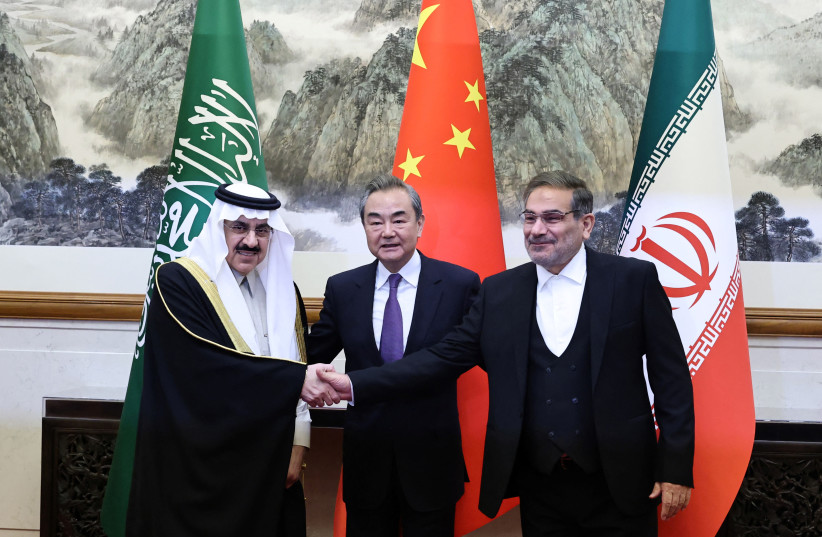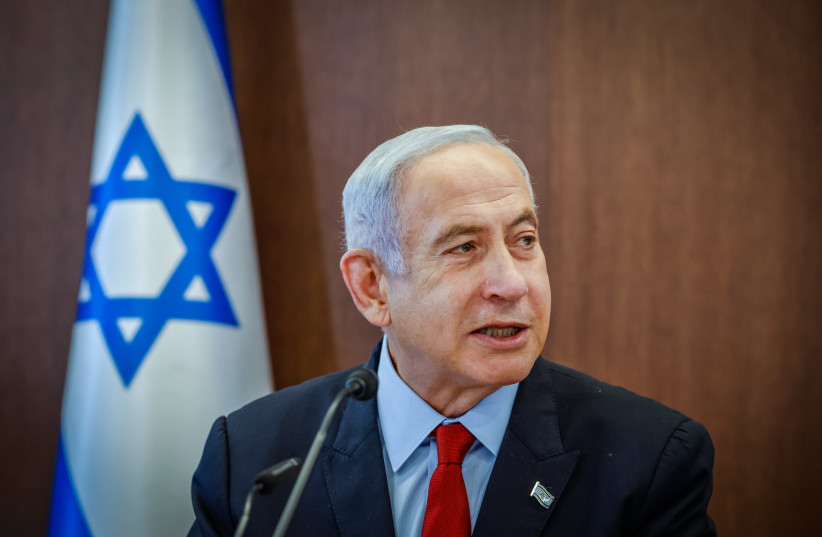by JPost Editorial
The deal between Saudi and Iran is a significant development in the Middle East. Israel needs to speak with its allies in Washington and urge the Biden administration to become more active.
 |
Wang Yi, a member of the Political Bureau of the
Communist Party of China (CPC) Central Committee and director of the
Office of the Central Foreign Affairs Commission, Ali Shamkhani, the
secretary of Iran’s Supreme National Security Council, and Minister of
State and national security adviser of Sau
(photo credit: CHINA DAILY VIA REUTERS)
|
The news over the weekend that Iran and Saudi Arabia agreed to reestablish relations took many policymakers by surprise and is seen by some as potentially casting a shadow over the possibility of Israel and Saudi Arabia progressing in their relations.
The deal, brokered by China, was announced after four days of previously undisclosed talks in Beijing between top security officials from the two rival Middle East powers.
It came just days after the Wall Street Journal reported that peace between Saudi Arabia and Israel is contingent on assistance from Washington in developing the Saudi civilian nuclear program and the provision of security guarantees.
A senior official traveling with Prime Minister Benjamin Netanyahu’s entourage to Italy naturally put the blame on his predecessors, as well as on the Biden administration.
“There was a feeling of American and Israeli weakness, so Saudi Arabia turned to other channels,” said the senior Israeli official, who briefed reporters in Italy.

Other observers said the rapprochement between the long-strained countries was in part due to Israel’s increasingly right-wing turn and political chaos unfolding due to the judicial reforms.
The move certainly must have been a surprise for Netanyahu, who has often portrayed Israel’s strength as a ticket to more relations in the region.
What does this mean for Israel and the Middle East going forward?
While all the critics of the Iran-Saudi deal may be correct, it would be wise to urge caution in how Israel moves forward. It would be good for the government to welcome the deal cautiously but to also draw the necessary conclusions.
First and foremost, the fact that China mediated a deal between two Middle Eastern powers says something about the US. China is a rival to America and the countries have been vying for influence over the region for decades. China’s ability to enter into the Iranian-Saudi standoff is a result of the vacuum created by the lack of US engagement in the region.
It is no secret that the Biden administration – and the Obama administration before it – viewed their role as moving away from the Middle East. Obama did this by setting redlines in Syria that were never enforced, allowing Russia to enter the country. The Biden administration has done the same by signaling to the Saudis and Emiratis that they are on their own when it comes to fighting the Houthis in Yemen.
China has outshone the US in the Middle East and that will have repercussions on Israel, whose alliance with America directly affects its own standing in the region. As we have long argued, when the US is strong and perceived as engaged in the region, this empowers Israel and vice versa.
On the other hand, Israel will need to wait and see if the normalization of ties between Iran and Saudi Arabia means that Riyadh will have more influence and connections when it comes to reining in Iran.
When Iran is more aggressive, whether in weapons trafficking to Lebanon or Yemen, or destabilizing Iraq and Syria, then Israel and Saudi Arabia are both threatened. Saudi Arabia cares deeply about Yemen and Lebanon, and also Iraq and Syria; and this means that Iran’s actions will be in the spotlight after the agreement.
We should welcome diplomacy as a pathway toward peace and stability in the region. At the same time, we should make it clear that the redlines relating to nuclear weapons production remain the same as in the past.
Riyadh does not want Iran to have a nuclear weapons program. It is likely true that China also does not want an Iranian bomb, even if Beijing has chosen to remain silent on this issue, or appear to support Iran against US sanctions in the past.
Israel’s other interest is to maintain its track of emerging and potential ties with Saudi Arabia. As we have seen with reconciliation with Turkey – which has warm relations with Tehran – relationships can evolve on separate tracks.
The deal between Saudi and Iran is a significant development in the Middle East. Israel needs to speak with its allies in Washington and urge the Biden administration to become more active. Sitting on the sidelines is not smart policy; other players will fill the void.
JPost Editorial
Source: https://www.jpost.com/opinion/article-734118
No comments:
Post a Comment